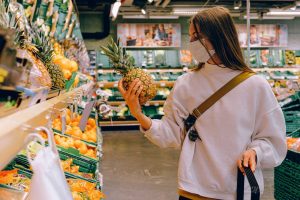 COVID-19 has helped reveal the ills and contradictions of our relationship with food, says ESRC Postdoctoral Fellow, Dr Jonathan Beacham.
COVID-19 has helped reveal the ills and contradictions of our relationship with food, says ESRC Postdoctoral Fellow, Dr Jonathan Beacham.
The COVID-19 pandemic and its widespread fallout has had far-reaching implications for food and agriculture. The onset of the crisis saw food pushed front and centre as images of shoppers stockpiling were contrasted with images of ‘vulnerable’ members of society browsing empty aisles, shopping lists in hand. These events have helped reveal the many ills and contradictions underpinning our relationship with food, highlighting the fragility of high-carbon transnational supply chains crisscrossing the planet that we have come to take for granted in putting food on supermarket shelves.
These ills run deeper and with more profound consequences for the worst-off members of society. As Alice Willatt and I argue in a soon-to-be published book, Life after Covid, edited by Martin Parker and published by Bristol University Press, COVID-19 has exacerbated food insecurity for many, with demand for emergency food provision (primarily through food banks) skyrocketing since the onset of the pandemic. These growing problems around food insecurity not only relate to corporate power over food, but also to social problems, for example low paid work, the rising cost of housing and changes to welfare. These dynamics all play out in geographically varied ways between rich and poor, even within postcodes.
On the one hand, COVID-19 appears likely to worsen these problems. Yet the context of the pandemic has generated other narratives. Research suggests that demand for local ‘direct-to-door’ delivery, such as in weekly veg boxes, has more than doubled in the UK. This signals that local economies might play a more significant role in food provisioning. Even more intriguing is the widespread emergence of ‘mutual aid’ networks at neighbourhood level, orientated around sharing and assistance for those who, for a wide variety of reasons, might otherwise struggle to access food.
These civil society initiatives have emerged as a key response to the crisis, often tying in with organisations that are revolutionising food. Here in Bristol, the Bristol Food Union has repurposed commercial kitchens to feed hundreds of people a day; from vulnerable members of society to frontline workers. Similar initiatives have emerged around the world, with a three-star Michelin restaurant in New York now feeding thousands in need every day.
So, what does the future hold for food? Even prior to the pandemic, discontent with the extent of corporate power was growing. We could see a future where mutual aid networks—imbued with a radical spirit of cooperation with one another rather than mere charity— continue to play a more prominent role. The question is what we can learn from the barely visible positive glimmers that have emerged in recent times in bringing about better futures.

